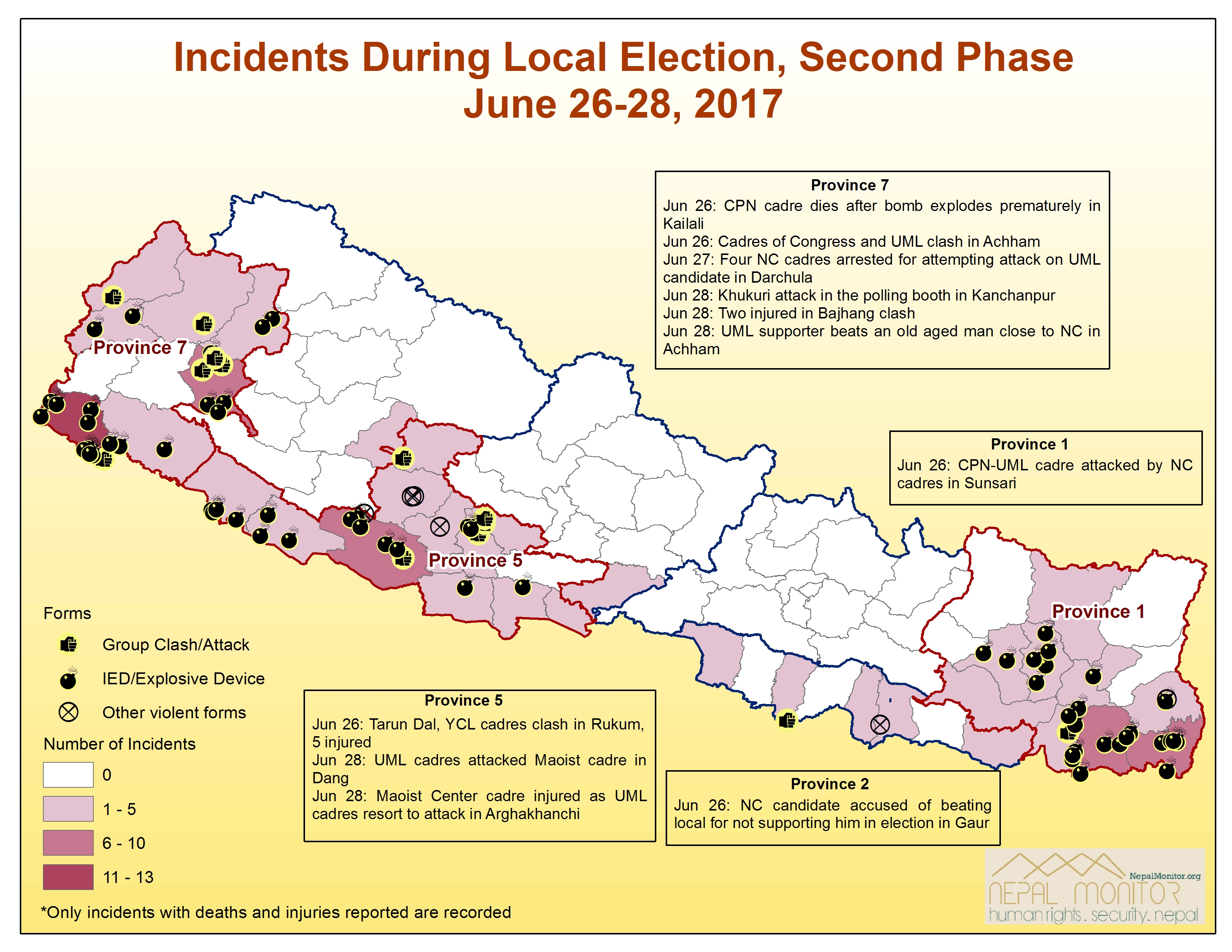Analysis
Factsheet: Electoral Violence and Contestation during Nepal’s Local Elections, Second Phase
2017-06-30

Local Level Election, Silence Period and Election Day: Second Phase
June 26 – 28, 2017
On June 28, 2017, more than 6.4 million voters were called upon to participate in the second phase of Nepal’s local polls, electing more than 15,000 local representatives in 334 local units across Provinces 1, 5, and 7. According to the Election Commission of Nepal voter turnout was 73.69 percent, similar to the May 14 first phase elections. Polling was postponed until September 18 in Province 2 after the government could not reach an agreement with agitating Rastriya Janata Party Nepal (RJPN).
Despite calls for boycott and bandhas declared in Province 1, 5, and 7 by dissatisfied parties and groups, large-scale violence was averted. However, between June 26 (when the campaign silence period began) and June 28 (election day), a total of 93 incidents were recorded, 85 of them violent. Many improvised explosive devices (IED) were planted and several exploded – often near polling stations or houses of candidates – in 19 districts, and clashes or assaults involving major political parties were reported in 10 districts. Notably, of the violent incidents recorded, Madhes-based parties were reported as causing only one minor incident of vandalism during the bandha.
This factsheet overviews election-related incidents during the campaign silence period and election day of the second phase of local elections (June 26-28, 2017) and is based on preliminary data recorded by NepalMonitor.org until 12:00 PM on June 29. It complements the the previous factsheet released after the first phase of local elections, as well as regular analysis updates produced about election-related violence in Nepal. Through its Nepal Peace Monitoring Project, COCAP | NepalMonitor.org gathers data on violence and non-violent contestation in Nepal. Together with the Democracy Resource Center Nepal (DRCN), COCAP has been releasing periodic analysis updates on incidents related to the local elections.
Incidents during the campaign silence period and election day, June 26-28, 2017
By noon on June 29, a total of 93 incidents had been recorded, 85 of them violent. One person was killed in Kailali when an IED he was carrying exploded. Approximately 20 others were injured in different election-related incidents. During the first phase of elections three citizens were killed and 43 injured during the equivalent silence and election day period. It is important to note that not covered in this fact sheet is that 43 people were reported as injured during clashes between the political parties on June 25, the last day of the campaign period before second phase elections. From June 26 to 28, clashes or violent attacks related to the election occurred in various localities across the country, including in Achham, Arghakhanchi, Bajhang, Dang, Darchula, Gulmi, Kanchanpur, Rautahat, Rukum, Sunsari.
Background
On February 20, the Government of Nepal announced that the first local elections in nearly 20 years would be held on May 14, 2017. The announcement was met with great enthusiasm, but also some skepticism given the short period of time to conduct preparations before the election date, as well as lack of agreement between political parties and other stakeholders about holding the polls.
The United Democratic Madheshi Front (UDMF) and other dissatisfied parties opposed the decision immediately, protested that their demands of a constitutional amendment on federal demarcation and proportional representation had not been met, and threatened to boycott and disrupt the election. Protests in the Terai led to violence that peaked with five people being killed in police shootings in Maleth, Saptari on March 6. On April 23, the national government negotiated with the Madhes based parties to ensure their participation in the elections, including agreeing to pass the long debated constitutional amendment bill, with some revisions. In anticipation that this would bring dissenting parties to participate, the government announced that it would hold elections in two phases, the second phase June 14, 2017.
The first phase of elections in Provinces 3, 4 and 6 was held on May 14, 2017. On June 11, Madhes-based parties led by RJP-N announced that they would boycott the elections and protest against and disrupt them across the Tarai as their demands had still not been met. In order to ensure the participation of RJP-N, the election was further postponed to be held on June 23. The second phase election date was again rescheduled to be held on June 28, considering the Ramadan festival celebrated by the Muslim community in the region. As the government failed to bring the RJP-N on board, voting for Province 2, covering central and eastern parts of the Tarai, was postponed to be held during a third phase on September 18, 2017.

